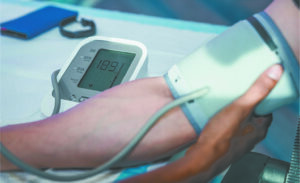By Kiersta Borrego, DO, Internal Medicine at Millennium Physician Group
 Preventive health screenings are a cornerstone of maintaining your long-term well-being. Many serious conditions, such as high blood pressure, high cholesterol, and high blood sugar levels, develop silently, yet can significantly increase your risk of heart disease, stroke, and other
Preventive health screenings are a cornerstone of maintaining your long-term well-being. Many serious conditions, such as high blood pressure, high cholesterol, and high blood sugar levels, develop silently, yet can significantly increase your risk of heart disease, stroke, and other
complications. Simple routine testing can reveal risks before they become problems, allowing you and your care team to take action to safeguard your health.
Blood Pressure Screening
Blood pressure measures the force of blood pushing against your arteries as your heart pumps. Many people don’t realize they have high blood pressure, because it has no symptoms – hence the nickname “the silent killer.” Over time, high blood pressure, also known as hypertension, can damage the heart, arteries, and kidneys, increasing your risk of heart attack, stroke, and other serious complications.
The only way to detect high blood pressure is through a blood pressure test. This test is usually quick, painless, and a routine part of most health checkups. When detected early, hypertension can often be managed effectively through a combination of lifestyle changes and, if necessary, medication. By regularly checking your blood pressure, you gain vital feedback that enables your care team to determine whether current treatment strategies are effective or if
adjustments are needed.
How often you should be tested depends on your age and health:
• Adults ages 18 – 39 with no heart disease risk factors should be tested at least once every 2 to 5 years.
• Adults 40 and older, or younger people with heart disease risk factors, should check annually.
• People with chronic conditions such as heart disease or hypertension may be checked more frequently.
For those with hypertension, monitoring at home can help track progress and guide treatment, but it should not replace regular visits with your healthcare provider.
Cholesterol Screening
Cholesterol screening is another essential tool in preventive care. High cholesterol rarely causes symptoms, but can silently lead to plaque buildup in arteries, restricting blood flow and raising the risk of heart attack, stroke, and other cardiovascular diseases.
The only way to test your cholesterol levels is through a blood test. A complete cholesterol test, sometimes called a lipid panel, measures:
• Total cholesterol: overall cholesterol count in your blood.
• Low-density lipoprotein (LDL) cholesterol: called “bad” cholesterol, too much contributes to plaque formation.
• High-density lipoprotein (HDL) cholesterol: called “good” cholesterol, it helps remove LDL cholesterol from arteries.
• Triglycerides: unused calories in your blood that become fat that may contribute to hardening or thickening of the arteries.
For most adults, cholesterol should be checked every four to six years; however, screenings may be more frequent for individuals with a family history of heart disease, diabetes, or hypertension. After age 40, your primary care provider may use cholesterol testing and other factors to calculate your 10-year risk of cardiovascular disease or stroke.
By identifying elevated cholesterol early, your healthcare provider may recommend targeted interventions, like dietary changes or medication, to reduce your long-term cardiovascular risk and protect your overall health.
Blood Glucose Screening
Blood glucose screening measures the sugar in your bloodstream. Glucose is your body’s main energy source, and maintaining healthy glucose levels is essential because imbalances can indicate prediabetes, diabetes, or other metabolic issues.
Hyperglycemia, or high blood glucose, occurs when your body doesn’t make enough insulin or can’t use it properly. This may be a sign of diabetes and can lead to complications over time, including heart disease, nerve damage, and kidney problems.
Hypoglycemia, or low blood glucose, is less common but can occur in individuals with certain medications or underlying medical conditions. Without treatment, it can be dangerous, potentially causing seizures or brain damage.
There are several types of blood glucose testing, typically done through blood samples, and your healthcare provider will select the most appropriate screening for you based on your health history, age, and current well-being. Testing is usually part of routine labwork, such as a basic or comprehensive metabolic panel, and may require fasting. Similar to other preventive screenings, early detection of abnormal blood sugar levels allows your provider to recommend lifestyle changes or medications to maintain healthy levels.
Preventive Care at Millennium Physician Group
The healthcare team at Millennium Physician Group is committed to helping patients maintain optimal health through preventive screenings. Through
personalized care plans and comprehensive
evaluations, we support you in staying healthy all year-round. If you’re due for a routine checkup, schedule a visit with your Millennium Physician Group provider.
Attention Medicare-Eligible Patients:
Medicare’s Open Enrollment Period runs from October 15 through December 7. This is the time each year to review your coverage and make any changes to your Medicare
Advantage or Part D
prescription drug plan. You can learn more at www.medicare.gov or by calling 1-800-MEDICARE.
713 E Marion Ave, Suite 1211
Punta Gorda, FL 33950
941.347.4592 | MillenniumPhysician.com
This information is intended for informational purposes only and is not intended to be a substitute for professional medical guidance, diagnosis or treatment. No physician-patient relationship is created by this or its use.







